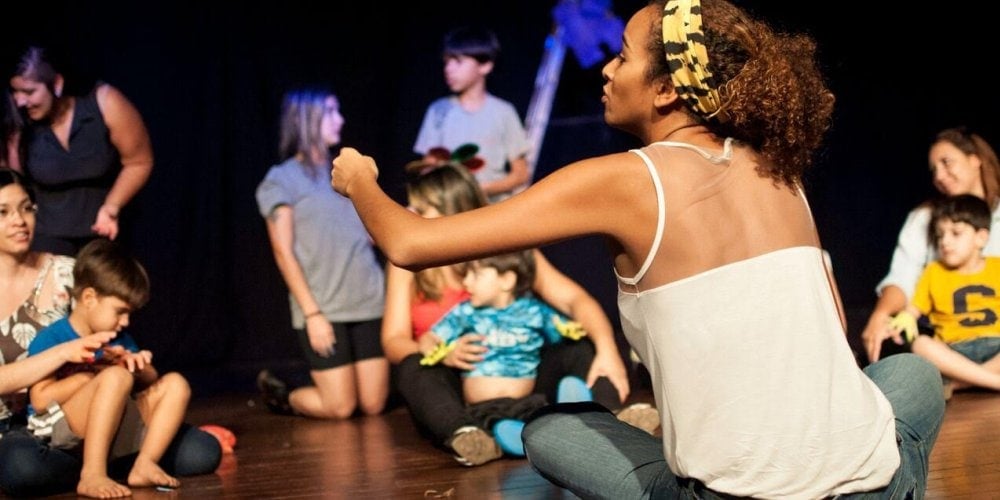
, South American Division
A Seventh-day Adventist music therapist is using skills learned in Pathfinders and church to reach autistic children in Brazil.
Ana Carolina Steinkopf, who at 24 is barely out of Pathfinders herself, has created a musical performance called “Uma Sinfonia Diferente” (A Different Kind of Symphony) that regularly brings together 21 children and their families, a psychologist and 21 psychology students, a camera crew, a photography crew, a band with seven musicians, and a production team.
Together the group uses sound, rhythm, melody, and harmony to create music that is not only enjoyed by the community in a local hall but, more important, makes it easier for autistic children to communicate, participants said.
“I can only do what I do today because of what I learned at church,” Steinkopf said.
“The musical side of my life was influenced by the church. It was there also that I learned to speak in public and to be a leader” in the local Pathfinder’s club, she said. “The church was a very good school.”
Autism, which begins during childhood and is associated with a difficulty to communicate and socialize, is believed to affect about 22 million people worldwide, including 2 million in Brazil. Its origins and treatment are not clearly understood.
Steinkopf said the idea for the musical performance came to her during her work as a music therapist at a clinic. She noticed that children who took part in music therapy sessions had an easier time communicating and relating to others.
Improving communication with families with special needs is a key reason why she includes the families of autistic children in the musical performances.
“Family is very important,” she said. “When family is involved, the child feels more motivated. When they make a movement or sound, the child feels encouraged to copy the same action. This is important because children with autism need to develop a bond.”
Brazilian neurologist Christian Müller, who is not connected with the project, said music is beneficial to human beings because it acts on the limbic system, the part of the brain responsible for emotions and social behaviors.
“The autistic child is hypersensitive to sounds,” he said. “This could be positive or negative. Loud noises can lead to irritability and even aggression. On the other hand, soft sounds bring calmness.”
Besides calming down the children, “music is a sensorial stimulus for communication,” said Ingrid Oliveira, a Brasilia-based psychiatrist who also is not involved with the musical performance.
“It works as a factor that contributes to the cognitive development of the listener,” she said.
For this reason, Steinkopf uses “A Different Kind of Symphony” to stimulate the senses of the children involved. For her, music brings security to these children.
“Music brings regularity, predictability, and safety because a child knows that the song will have beginning, middle, and end,” Steinkopf said. “It will not change. Children with autism need routine.”
One of the characteristics of an autistic child is rigidness in behavior, repetition, and tendency to “do things their own way,” Oliveira said. Having routines stabilizes the child’s behavior and helps the child avoid aggressiveness and restlessness, she said.
Müller noted, however, that even though a routine helps control anxiety, it should not be understood as a type of treatment.
Steinkopf said she has seen God’s hand throughout the development of the project. A Seventh-day Adventist believer since childhood, she participated in the Pathfinder club and various musical ministries at church while growing up. Pathfinders is a scouting group for children from the ages of 10 and 15, although children sometimes participate into their late teens.
Steinkopf started working on the musical performance last November.
“I prayed a lot before doing this project and asked God to be in control,” she said.
“After that, He has not left my mind and continuously reminds me, ‘Inasmuch as you did it to one of the least of these My brethren, you did it to Me,’” she said, quoting Jesus’ words in Matthew 25:40.
Steinkopf sees the musical performances, which with rehearsals last a combined five hours a week and don’t generate any money, as an opportunity to take Jesus to special-needs families.
“When you do something that you believe in and that you know is going to help other people, you don’t care about getting money,” she said. “The best payment is seeing an improvement in the child and the bond of love growing between the child and his or her parents and siblings.”